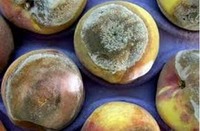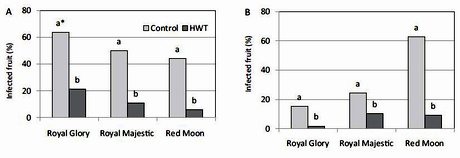 In recent years, the scientific research on safer methods for the control of fruit postharvest pathogens has increased. Moreover, no chemical treatments are allowed on stone fruit after harvest in European Countries. The alternative strategies suggested for Monilinia rots control include treatments based on biocontrol agents, food additives, natural substances or physical methods. Among the last treatments, the heat treatments could represent an effective and safe control strategy to manage the postharvest fruit decay caused by Monilinia spp. (M. fructicola, M. fructigena, M. laxa), responsible of high production losses during storage and market distribution.
In recent years, the scientific research on safer methods for the control of fruit postharvest pathogens has increased. Moreover, no chemical treatments are allowed on stone fruit after harvest in European Countries. The alternative strategies suggested for Monilinia rots control include treatments based on biocontrol agents, food additives, natural substances or physical methods. Among the last treatments, the heat treatments could represent an effective and safe control strategy to manage the postharvest fruit decay caused by Monilinia spp. (M. fructicola, M. fructigena, M. laxa), responsible of high production losses during storage and market distribution.Scientists at the University of Bologna (Italy) have investigated the effect of hot water treatment (HWT: dipping at 60°C for 30 or 60 seconds) on brown rots in peaches and nectarines. The scientists tested fruit naturally infected in commercial trials, furthermore they evaluated the HWT effect on fruit quality, in terms of firmness, soluble solids content, and titratable acidity
The results showed a good antifungal activity of HWT. Compared to the control fruit (treated with water at ambient temperature), after storage of 6 days at 0°C and 3 days at 20°C, the brown rot was reduced by over 78% on hot water treated fruit. In addition, the hot water treated fruit showed an acceptable commercial quality and no visual damage was detected as consequence of HWT.
Figure - Effect of hot water treatment (60◦C) against Monilinia rots on naturally infected peaches. (A) Semi-commercial trials. The sample unit was represented by three boxes (replicate) of 60 fruits each. The duration of treatment was 20 s. (B) Commercial trials. The sample unit was represented by three bins (replicate). The duration of treatment was 1 min. In both trials, after treatment fruit were stored at 0◦C for 6 days and subsequently for another 3 days at 20◦C. The brown rot incidence was recorded at the end of the experiment and the trials were conducted three times. Within the same trial and cultivar the same letters represent no significant differences according to LSD test (P < 0.05). Click here to enlarge the figure.

The scientists conclude highlighting the efficacy of HWT in controlling the brown rots caused by Monilinia spp. on peaches and nectarines and the HWT potentiality to be used for both organic and conventional production. HWT is safe and readily available method because no authorization is needed, furthermore the energy used for water heating can be obtained from refrigeration systems through thermal dissipation by condensators.
Source: Spadoni A., Neri F., Bertolini P., Mari M., "Control of Monilinia rots on fruit naturally infected by hot water treatment in commercial trials", 2013, Postharvest Biology and Technology, 86: 280-284. Further info: http://www.sciencedirect.com/science/article/pii/S0925521413002159










